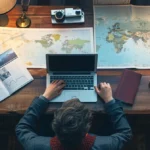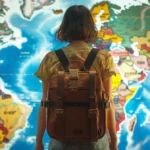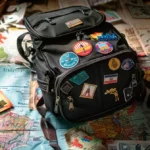Table Of Contents:
- Mastering the Art of Slow Travel: A Guide for Perpetual Travellers
- Key Takeaways
- Understanding Slow Travel: The Philosophy Behind It
- The Origins and Evolution of Slow Travel
- How Slow Travel Differs From Traditional Tourism
- Embracing a Mindful Travel Mindset
- Overcoming Common Misconceptions About Slow Travel
- The Importance of Pace and Presence
- Benefits of Slow Travel for Perpetual Travellers
- Cultivating Deeper Cultural Connections
- Enhancing Personal Growth and Self-Awareness
- Economic Advantages of Extended Stays
- Positive Environmental Impacts of Slow Travel
- Building Meaningful Relationships Around the World
- Planning Your Slow Travel Journey
- Selecting Destinations Suited for Slow Exploration
- Crafting a Flexible and Open-Ended Itinerary
- Budgeting for Long-Term Travel Adventures
- Essential Packing Tips for Perpetual Travellers
- Navigating Visas and Travel Documentation
- Immersing Yourself in Local Cultures and Communities
- Immersing Yourself in Local Cultures and Communities
- Learning and Using the Local Language
- Participating in Community Events and Traditions
- Engaging in Volunteer Opportunities Abroad
- Supporting Local Businesses and Artisans
- Respecting and Adapting to Cultural Norms
- Sustainable and Responsible Travel Practices
- Minimizing Your Environmental Footprint
- Ethical Considerations When Travelling
- Choosing Eco-Friendly Accommodations
- Practicing Mindful Consumption and Waste Reduction
- Contributing to Conservation Efforts
- Thriving as a Perpetual Traveller
- Managing Finances While on the Move
- Staying Connected With Friends and Family
- Maintaining Health and Wellness Abroad
- Balancing Remote Work and Travel Life
- Overcoming the Challenges of Long-Term Travel
- Conclusion
Mastering the Art of Slow Travel: A Guide for Perpetual Travellers
Are you tired of the stress that comes with traditional travelling? Many feel overwhelmed by tight schedules and endless attractions to tick off their lists. In “Mastering the Art of Slow Travel: A Guide for Perpetual Travellers,” you’ll learn how to embrace a more relaxed approach, reframe your travel experiences, and truly immerse yourself in new cultures. This guide will show you how to plan your journey with less baggage, connect with local communities, and adopt sustainable practices. Together, we’ll tackle the common challenge of feeling rushed while travelling and help you enjoy the moments that truly matter.
Key Takeaways
- Slow travel promotes deep cultural connections and meaningful experiences over rushed itineraries
- Mindfulness enhances your travel experience, allowing you to appreciate every moment fully
- Supporting local economies through authentic engagement fosters responsible tourism and enriches your journey
- Flexible itineraries allow for spontaneity, leading to unexpected and memorable travel experiences
- Prioritizing sustainability reduces your environmental impact while enjoying immersive travel adventures
Understanding Slow Travel: The Philosophy Behind It

Slow travel emphasizes quality over quantity, rooted in a mindful exploration of one’s surroundings. It originates from a desire to escape the motion blur of traditional tourism, encouraging you to savor experiences like a nomad rather than rushing through them. You will discover how losing the vehicle of haste allows for deeper connections, enhancing moments of meditation through presence. In this section, we will clarify misconceptions and highlight the fundamental importance of pacing your journey.
The Origins and Evolution of Slow Travel
The concept of slow travel has its roots in the slow food movement that emerged in Italy in the 1980s, which prioritized cooking with local ingredients and savoring meals. This philosophy eventually influenced how individuals approach travel, shifting focus from ticking off destinations to truly experiencing them. By engaging with the culture and traditions of a place, you will find that slow travel fosters a richer understanding of your surroundings.
As slow travel gained popularity, it evolved to address the growing mental health concerns associated with fast-paced lifestyles. Many travelers began to realize that constant movement and hurried itineraries led to stress and exhaustion, detracting from the enjoyment of their journeys. By adopting a slower pace, you can enhance your mental well-being, allowing your mind the space and attention needed to appreciate the details of your experience.
Incorporating elements of mindfulness into your travels, such as taking time to reflect or engage in cooking classes, can transform your journey. This approach encourages you to connect with locals, learn about traditional methods, and savor each moment, rather than rushing through. When you embrace this philosophy, you allow yourself to appreciate the true essence of travel and cultivate a deeper appreciation for the world around you.
How Slow Travel Differs From Traditional Tourism
Slow travel diverges from traditional tourism primarily by emphasizing immersive experiences over a packed itinerary. Instead of racing from one attraction to another, you take the time to engage with the local culture. For instance, if you found yourself in Provence, you might choose cycling through lavender fields rather than quickly ticking off famous landmarks, allowing you to absorb the environment and embrace a more meaningful connection to the destination.
This approach also prioritizes sustainability, as it encourages you to consider the environmental and social impacts of your travels. By choosing to stay longer in one place, you reduce your carbon footprint compared to constantly moving between locations. It aligns perfectly with the lifestyle of a digital nomad, who often seeks stability while maintaining a flexible work schedule, thus allowing for both productivity and enjoyment in the travel experience.
Moreover, slow travel promotes a lifestyle filled with energy and balance, countering the exhaustion that often accompanies fast-paced tourism. You focus on activities that enhance your well-being, such as cooking classes or local art workshops, rather than simply capturing Instagram moments. By adopting this mindset, you cultivate a profound appreciation for every moment of your journey, empowering yourself to live richly in the present.
Embracing a Mindful Travel Mindset
Embracing a mindful travel mindset is crucial for enjoying the benefits of slow travel. As you navigate your journey, focus on reducing the pressure of having a packed schedule. Allow yourself to savor a meal at a local restaurant or engage in a conversation with a fellow traveler or local resident, deepening your experience and enriching your understanding of the culture.
Slow movement is fundamental to this approach; it encourages you to slow down and fully appreciate your environment. When you treat each day as an opportunity to explore rather than a checklist of places to visit, you begin to discover the hidden gems often overlooked by hurried tourists. This could mean spending an afternoon at a local market, observing the interactions of vendors and customers, or taking time to enjoy the beauty of a park that you might have passed by.
As a passenger in this journey, you have the power to shape your experience. By allowing spontaneity into your travel plans, you create room for unexpected moments that can be the highlight of your trip. Consider approaches such as planning flexible itineraries that prioritize leisure and exploration, rather than rigid schedules:
- Reduce the pressure of strict deadlines.
- Prioritize meaningful conversations over rushed engagements.
- Engage in slow movement that encourages observation and reflection.
Overcoming Common Misconceptions About Slow Travel
A common misconception about slow travel is that it equates to boredom or a lack of activities. In reality, adopting a slower pace enhances your vacation experience by allowing you to immerse yourself in your surroundings and discover hidden gems. Instead of rushing from landmark to landmark, you can engage with local cultures and build meaningful connections along the trail of your journey.
Another myth is that slow travel is impractical for those who rely on social media to document every moment. In fact, this approach allows for more authentic posts and experiences that resonate deeper with your audience. By focusing less on the rush of motion and more on the moments that matter, your travel experiences can translate into richer content that engages your followers.
Many assume that slow travel requires extensive planning and that it lacks flexibility, but this couldn’t be further from the truth. By using various forms of transport, you can still change your itinerary as you go, making spontaneous decisions that enhance your journey. This flexibility ensures that you can freeze a moment for reflection or explore a side alley, which typically would be missed in a hurried schedule:
- Embrace spontaneity in your travel plans.
- Focus on authentic experiences over superficial ones.
- Use local transport to connect with the culture.
The Importance of Pace and Presence
The pace at which you travel plays a crucial role in shaping your experiences and connections. By moving slowly through a village rather than rushing to the next destination, you allow yourself to engage more fully with the local culture and traditions. This shift in focus leads to richer emotional experiences, which can significantly enhance your understanding of a place.
Taking your time creates space for reflection, allowing you to appreciate the texture of everyday life in a new environment. You might visit a local market and interact with vendors, learning about their crafts and customs. This engagement not only reduces your carbon footprint but also supports sustainable tourism, as your spending benefits the community directly.
Your presence in each location becomes more meaningful when you prioritize depth over breadth. Instead of just collecting stamps in your passport, you forge connections and create lasting memories. By embracing a slower pace, you leave a positive footprint—not just in the places you visit, but in the relationships you build and the experiences you cherish along the way.
Slow travel invites you to savor each moment, to breathe and observe. Now, let’s explore how this approach brings valuable rewards for those who travel with no end in sight.
Benefits of Slow Travel for Perpetual Travellers
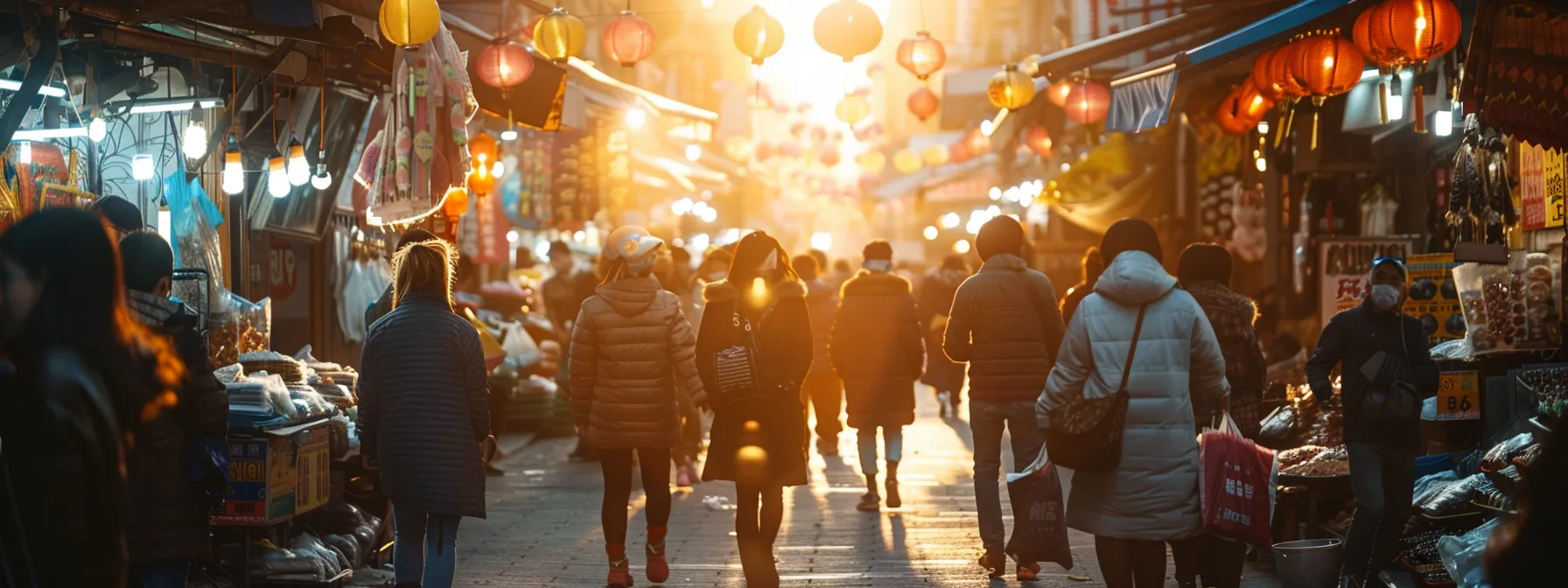
Slow travel offers significant benefits for perpetual travellers, enhancing your exploration experience while fostering sustainable living practices. You will cultivate deeper cultural connections, boost your personal growth, and gain self-awareness through meaningful interactions. Additionally, extended stays can lead to economic advantages, particularly when utilizing public transport, while contributing to positive environmental impacts. This section will delve into these aspects, including how to build lasting relationships around the world.
Cultivating Deeper Cultural Connections
Cultivating deeper cultural connections is a fundamental benefit of slow travel, particularly for perpetual travellers. By immersing yourself in local communities rather than merely visiting tourist attractions, you create meaningful relationships that enhance your understanding of the culture. Engaging with residents, sharing meals, and participating in workshops offers insights that photographs alone cannot capture, building a more authentic travel experience.
This approach aligns seamlessly with the principles of ecotourism, as it promotes the preservation of local traditions and environments. As you explore a destination, consider incorporating remote work into your travel plan to extend your stay and deepen your connection with the community. This not only allows you to contribute positively to the local economy but also enables you to learn from the culture in a way that fleeting visits cannot provide.
Moreover, fostering these connections empowers you to appreciate the nuances of everyday life, which enriches your journey. You may find that the stories shared by local artisans or the traditions witnessed during a cultural festival create lasting memories far beyond typical tourist experiences. By choosing to travel slowly, you not only enhance your personal growth but also leave a positive impact on the communities you visit, embodying the true essence of a responsible traveller.
Enhancing Personal Growth and Self-Awareness
Enhancing personal growth and self-awareness is a remarkable benefit of slow travel that you can experience firsthand. By adopting a mindful mindset, you position yourself to explore new cultures and environments with a fresh perspective. Instead of getting caught in the whirlwind of traditional tourism, taking your time allows you to reflect deeply on your experiences and develop a richer understanding of yourself and the world around you.
During your travels, consider engaging more authentically with the local community. For instance, while in Tuscany, you might participate in cooking classes or art workshops that not only teach you new skills but also challenge your preconceptions. This active participation can lead to personal revelations, helping you understand how diverse cultures shape different lifestyles and philosophies.
Ultimately, by emphasizing a slower pace and Genuine connections, you can cultivate a sense of self-awareness that enhances your journeys. Engaging with locals, sharing stories, and reflecting on your experiences can lead to profound insights about your values, desires, and personal growth. This holistic concept of travel transforms your encounters into opportunities for self-discovery, enriching your life beyond just the trip itself:
Economic Advantages of Extended Stays
By opting for extended stays in a single location, you can experience substantial economic benefits while embracing the philosophy of slow travel. You may find that long-term accommodations, such as renting an apartment or staying in a homestay, often cost less than the cumulative expenses of frequent hotel stays. This financial flexibility increases your ability to engage with the local community, enhancing your experience and allowing you to live out the idea of “la dolce vita,” which promotes enjoying life to the fullest.
Your productivity can also improve with extended stays, as you gain the opportunity to establish a routine in a familiar environment. This consistency can foster deeper connections with locals, creating a sense of belonging and compassion towards the community you inhabit. You will likely discover that such relationships not only enhance your travel experience but can lead to unexpected advantages, like discounts or local insights that would otherwise remain hidden.
Moreover, prolonging your time in one place can contribute to reduced carbon emissions. You will minimize the frequent travel associated with moving from one destination to another, supporting more sustainable tourism practices. This shift towards slow travel not only enhances your overall experience but also ensures that your adventures leave a lighter footprint on the landscape you explore, aligning your travels with responsible living principles.
Positive Environmental Impacts of Slow Travel
Embracing slow travel significantly reduces your environmental impact, allowing you to explore with greater awareness. By opting for a single destination and avoiding excessive day trips, you naturally minimize your carbon footprint. This approach not only supports local economies but also allows you to appreciate the beauty of a place without the rush.
When you choose to stay longer in one location, such as a quaint village renowned for its wine tasting, you engage more deeply with the community and its surroundings. This deeper connection promotes sustainability as your interactions help maintain local traditions and practices. You will find that the benefits extend beyond the suitcase you carry—your actions can foster a positive environmental impact.
Slow travel encourages a mindful exploration of your chosen destination, as you focus on preserving its beauty for future generations. By aligning your travel habits with sustainable practices, you set an example for other travelers. Every conscious decision, from how you photograph your journey using the rule of thirds to how you engage with locals, contributes to a more environmentally responsible travel experience:
Building Meaningful Relationships Around the World
As a perpetual traveller, building meaningful relationships while exploring new places enriches your journey significantly. By choosing to engage with local communities, you enhance your cultural understanding and create lasting bonds that can lead to personal growth. Participating in local events or volunteer opportunities allows you to connect with residents on a deeper level, turning your travels into an exchange of experiences rather than just an observation of sights.
Utilizing resources like the Nomad Passport Index can help you make informed decisions on where to travel while fostering relationships with your surroundings. When you focus on building connections with locals, you may discover unique experiences such as homestays or workshops that are not typically available in traditional tourism. This approach enables you to become a part of the community, gaining insights and creating memories that last beyond your visit.
As you embrace slow travel, the friendships you form can also lead to future opportunities, both personally and professionally. These relationships can offer pathways for collaboration or even inspiration for your next adventure. When you prioritize genuine interactions over fleeting encounters, you realize that the world is full of resources and support, making your travels even more rewarding:
With each gentle step, you feel the world open up around you. Now, it’s time to consider how to shape your slow travel journey into something truly memorable.
Planning Your Slow Travel Journey
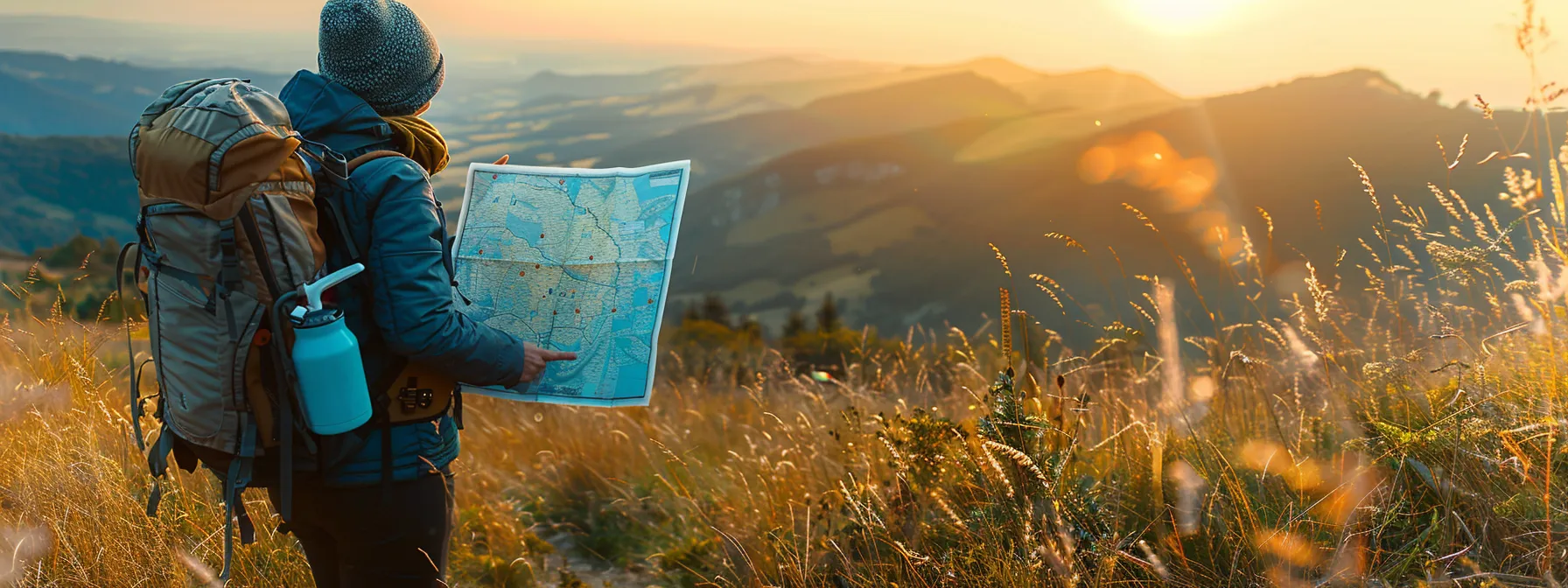
To plan your slow travel journey effectively, focus on selecting destinations that invite exploration and connection. Crafting a flexible, open-ended itinerary allows for spontaneous adventures while budgeting ensures you can sustain your travels. Essential packing tips will help you travel light, and understanding visa requirements will keep your journey smooth. Each of these elements plays a key role in mastering the art of slow travel.
Selecting Destinations Suited for Slow Exploration
When selecting destinations for slow exploration, consider places that offer rich cultural experiences and opportunities for meaningful interactions. Look for locations known for their welcoming communities, where you can participate in local customs and traditions. For example, opting for smaller towns allows for immersion in the daily lives of local residents, enhancing your understanding and appreciation of their way of life.
Choosing destinations with accessible natural beauty can also enhance your slow travel experience. Locations that allow easy access to parks, mountains, or beaches encourage leisurely exploration, whether through hiking, cycling, or simply relaxing in nature. For instance, the coastal towns of Portugal, with their stunning views and relaxed atmosphere, provide inviting settings to unwind while still engaging with local life.
Ultimately, prioritize places that encourage a slower pace of life and offer a genuine sense of community. Research locations that feature festivals or markets, which provide excellent opportunities to connect with locals and enjoy the culture at a relaxed tempo. Such experiences emphasize connection over sightseeing, embodying the essence of slow travel:
Crafting a Flexible and Open-Ended Itinerary
Crafting a flexible and open-ended itinerary is essential for your slow travel journey. This approach allows you to shift plans based on your interests and the experiences you uncover along the way. For example, if you stumble upon a local festival while exploring, you can adjust your schedule to fully immerse yourself in that unique cultural event, creating memories that go beyond your initial expectations.
As you plan, consider leaving significant gaps in your itinerary to facilitate spontaneity. By doing so, you permit yourself to enjoy leisurely walks or engage in deeper conversations with locals. This flexibility not only enriches your travel experience but helps to build connections that are often missed in a tightly packed schedule.
Additionally, use technology to your advantage by utilizing apps that provide real-time insights into local happenings. These tools can help you discover unexpected gems, such as pop-up markets or art exhibits, allowing you to adapt your plans seamlessly. Embracing this adaptable mindset ensures that every moment of your journey contributes to your understanding of the culture and enhances your overall travel experience.
Budgeting for Long-Term Travel Adventures
When budgeting for long-term travel adventures, it is crucial to assess your financial situation realistically. Start by calculating your monthly expenses at home and compare them to potential costs in your travel destinations. This approach allows you to identify areas where you can save money and determine how long you can sustain your travels without compromising your lifestyle.
Consider implementing a daily budget to manage your expenditures effectively. Factor in accommodation, food, transportation, and activities while leaving room for unexpected expenses or spontaneous opportunities. Using travel budgeting apps can be particularly helpful, as these tools allow you to track your spending and adjust your plans based on your financial situation.
Exploring alternative accommodation options can also lead to significant savings during your travels. Instead of traditional hotels, look into renting apartments, house-sitting, or staying with locals through platforms that cater to budget-friendly travelers. These choices not only reduce costs but also provide opportunities for deeper interactions with communities, aligning perfectly with the philosophy of slow travel.
Essential Packing Tips for Perpetual Travellers
Packing efficiently is crucial for your slow travel journey, allowing you to remain flexible and comfortable. Choose versatile clothing items that can be layered and mixed, ensuring they suit both warm and cool climates. This will give you the freedom to adapt to varying environments without overloading your luggage.
When determining what to include, prioritize essentials that promote self-sufficiency, such as a portable water bottle, reusable utensils, and a compact first aid kit. These items not only make your journey smoother but also align with sustainable travel practices that support your slow travel philosophy. Keeping your focus on practicality enables you to engage more profoundly with each destination.
Lastly, limit your packing to a manageable amount by adhering to the “one in, one out” rule. This means for every new item you bring, consider leaving something behind. Reducing your luggage will enhance your mobility, giving you the chance to explore spontaneously and connect with local cultures more easily along your path.
Navigating Visas and Travel Documentation
Navigating visas and travel documentation is crucial for your slow travel journey. Before you set off, research the visa requirements of each country on your itinerary. Understanding whether you need a tourist visa, work visa, or residency permit can save you time and prevent unexpected complications during your travels.
As you plan, consider applying for long-term visas that align with your slow travel philosophy. Many countries offer options for digital nomads or extended stays that allow you to immerse yourself in the local culture without the hassle of frequent renewals. For example, having a visa that permits a longer stay gives you the freedom to build connections and explore more deeply.
It’s also wise to keep copies of important travel documents, including your passport and visa, both physically and digitally stored in the cloud. In case of theft or loss, having these backups ensures you can quickly address issues. Staying organized with your documentation makes your journey smoother, allowing you to focus on enjoying your travel experience rather than worrying about bureaucratic hurdles.
You laid the groundwork for your journey, mapping out destinations and routes. Now, it’s time to step away from the guidebooks and dive into the heart of the places you visit.
Immersing Yourself in Local Cultures and Communities

Immersing Yourself in Local Cultures and Communities
Learning and using the local language enhances connections during your travels. Participating in community events and traditions enriches your experience, while engaging in volunteer opportunities abroad fosters deeper relationships. Supporting local businesses and artisans not only helps the economy but also showcases your respect for the culture. Adapting to cultural norms ensures a respectful and meaningful engagement with the communities you explore.
Learning and Using the Local Language
Learning the local language can significantly enrich your travel experience. By making an effort to communicate in the native tongue, you can connect more authentically with locals, facilitating deeper conversations and building relationships. Even basic phrases can go a long way in showing respect for the culture and its people, which often leads to more profound interactions.
Consider investing time in language learning before you travel, using apps or online courses to grasp essential vocabulary and phrases. For example, learning how to say greetings, thank you, and please in the local language can open doors. Once you arrive, practice these skills with your environment—whether at a market or a café—to transform your experience from tourist to part of the community.
Your efforts in learning the local language can lead to unique opportunities, such as participating in local events or informal gatherings. These experiences not only allow you to immerse yourself in the culture but also strengthen your language skills. Engaging with locals in their language fosters goodwill and enriches your slow travel journey, creating lasting memories:
Participating in Community Events and Traditions
Participating in community events and traditions offers a unique avenue for enhancing your slow travel experience. These gatherings allow you to immerse yourself in local culture, providing you with firsthand insights into way of life that typical tourist activities may overlook. Engaging in neighborhood festivals, workshops, or local markets enables you to connect with residents and experience the vibrancy of their customs and traditions.
As you join in these celebrations, you gain cultural knowledge that enriches your journey. Whether it’s learning traditional dances during a festival or helping out in a local cooking class, these hands-on experiences foster meaningful relationships with locals. You will find that these moments not only deepen your understanding of the community but also create lasting memories that define your travels.
Moreover, participating in community events reflects your respectful approach to travel, showing appreciation for the culture you are exploring. This engagement contributes positively to local economies and helps preserve traditional practices. By being an active participant, you transform from a mere observer into a valued member of the community, amplifying the impact of your travels and elevating your overall experience.
Engaging in Volunteer Opportunities Abroad
Engaging in volunteer opportunities abroad is a powerful way to immerse yourself in local cultures and communities. By participating in service projects, you gain hands-on experience that deepens your understanding of the society you’re visiting. This involvement not only enriches your travels but also allows you to contribute positively, leaving a lasting impact on the people you meet.
Many organizations offer volunteer programs that cater to various interests, such as education, environmental conservation, and community development. You may find yourself teaching English in a rural school or assisting in wildlife conservation efforts. These experiences enable you to connect with locals, learn about their challenges, and understand their perspectives—all while making your travels more meaningful.
As you choose to volunteer, consider how these opportunities align with your travel goals. Engaging with communities through volunteering fosters genuine relationships and gives you a sense of belonging in a new environment. It transforms your journey from a series of sights to a collection of valuable human experiences, enhancing the overall richness of your slow travel experience.
Supporting Local Businesses and Artisans
Supporting local businesses and artisans is a vital aspect of slow travel that enhances your experience and benefits the community. When you choose to shop at local markets or dine in family-run restaurants, you foster economic growth in the areas you visit. This not only helps keep traditions alive but also connects you more deeply to the culture and its people.
Engaging with artisans allows you to appreciate the craftsmanship behind their work, whether it’s handmade pottery, textiles, or food products. By purchasing these unique items, you ensure that your contributions go directly to the creators and their families, providing them with a sustainable livelihood. This action becomes more than just a transaction; it transforms into an exchange of stories and skills, enriching your journey.
Moreover, supporting local businesses can lead to authentic experiences you might not find in tourist-centric areas. You may be invited into a workshop, where you can learn traditional techniques directly from the artisans or participate in a cooking class that highlights local cuisine. These interactions create lasting memories and a genuine appreciation for the culture you are exploring while encouraging responsible tourism practices that benefit everyone.
Respecting and Adapting to Cultural Norms
Respecting and adapting to cultural norms is essential for your journey as a perpetual traveller. Understanding local customs, manners, and traditions can significantly enhance your interactions with the community, allowing deeper connections and meaningful experiences. By taking time to research and observe local practices, you demonstrate respect and appreciation for the culture you are exploring.
When you engage with locals, adjusting your behavior to align with their customs is vital. For instance, in some countries, greeting with a firm handshake or bowing may show respect, while in others, a simple smile is sufficient. Such gestures not only foster goodwill but also enrich your slow travel experience by creating genuine connections that go beyond surface-level interactions.
Additionally, adopting a mindset open to learning enhances your cultural immersion. You might participate in traditional meals where local etiquette is highlighted, such as eating with your hands in parts of Asia or using specific utensils in various Western cultures. Being attentive and willing to adapt showcases your commitment to fully engaging with the environment, enhancing both your understanding and enjoyment of your travels:
As you connect with local cultures, consider how your presence impacts the world around you. Embracing sustainable travel practices not only enriches your journey but also preserves these communities for others to explore.
Sustainable and Responsible Travel Practices
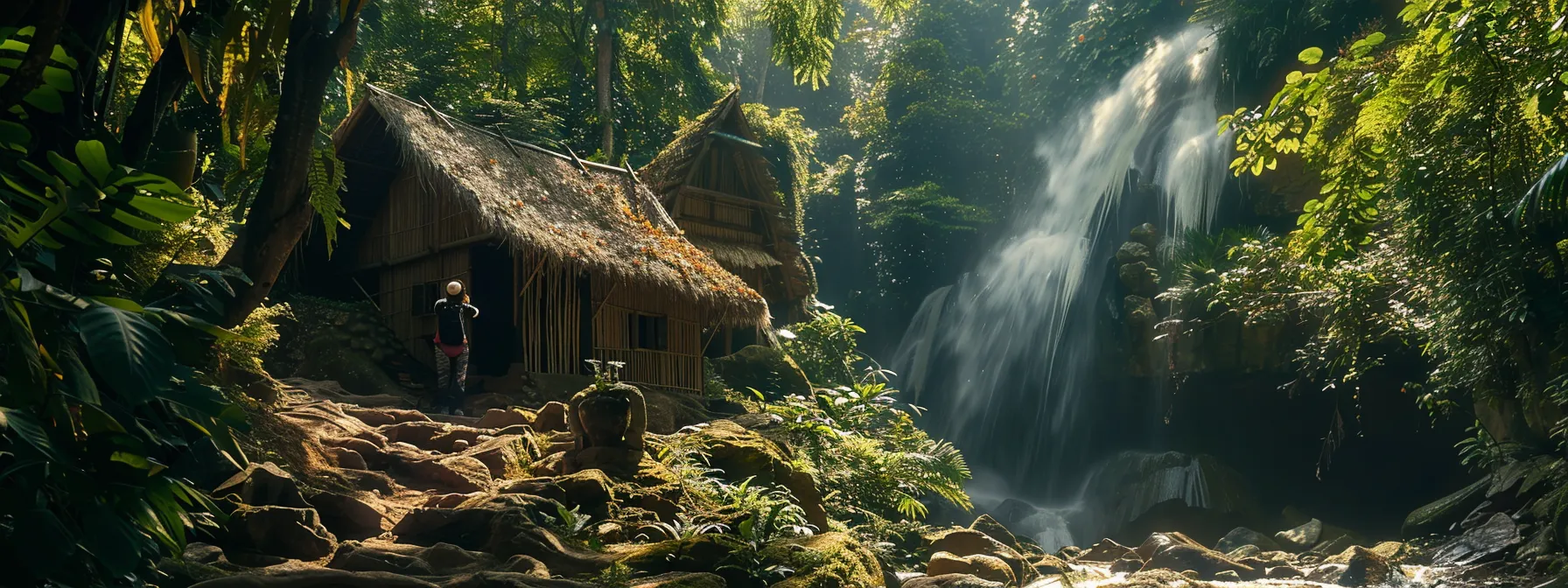
To master slow travel, it’s essential to adopt sustainable and responsible practices. You can minimize your environmental footprint by choosing eco-friendly accommodations and engaging in mindful consumption while reducing waste. Ethical considerations when traveling also play a critical role, as does contributing to conservation efforts that protect the destinations you explore. Each of these practices enhances your experience while positively impacting the communities you visit.
Minimizing Your Environmental Footprint
Minimizing your environmental footprint is a key aspect of embracing slow travel. By selecting eco-friendly accommodations, such as eco-lodges or hostels that prioritize sustainability, you can ensure your stay has a reduced impact on the environment. Look for places that use renewable energy sources and support local conservation efforts, as these choices align with your values as a responsible traveler.
Utilizing public transportation, biking, or walking within your destination further contributes to reducing your carbon emissions. When you choose these methods over renting a car or relying on taxis, you not only lessen your environmental impact but also engage more intimately with your surroundings. This approach allows you to discover hidden gems and interact with locals, enhancing your overall travel experience.
Lastly, being mindful of your consumption habits plays a significant role in minimizing waste. Opting for refillable water bottles, bringing reusable shopping bags, and choosing locally-sourced food can substantially decrease the amount of plastic and waste generated during your travels. By adopting these practices, you set an example for others and contribute to preserving the natural beauty of the places you visit, ensuring they remain vibrant for future generations of travelers.
Ethical Considerations When Travelling
When traveling, it’s essential to consider the ethical implications of your actions. By being mindful of local cultures and traditions, you demonstrate respect for the communities you visit. Engaging with locals, understanding their customs, and participating in their traditions can help establish deeper connections and ensure that your presence is welcomed and appreciated.
Supporting local businesses is another critical aspect of ethical travel. When you choose to eat at family-run restaurants or purchase handmade goods from local artisans, you contribute directly to the community’s economy. This not only helps sustain local livelihoods but also enhances your travel experience by providing you with authentic insights into the culture and way of life in the region.
Lastly, consider the environmental impact of your travel decisions. Opting for eco-friendly activities and sustainable transportation methods, such as biking or public transport, can significantly reduce your footprint. By prioritizing responsible practices, you not only enjoy a more enriching travel experience but also play a part in preserving the beauty of the destinations you visit for future travelers.
Choosing Eco-Friendly Accommodations
Choosing eco-friendly accommodations is a vital step in your journey towards sustainable travel. Look for lodgings that implement green practices, such as using renewable energy, recycling programs, and water-saving initiatives. By opting for these types of establishments, you significantly reduce your carbon footprint and contribute to the preservation of the environment.
Many eco-friendly hotels and hostels prioritize locally-sourced materials and support community initiatives. When you stay at these locations, you not only enjoy a more authentic experience but also help boost the local economy. This involvement fosters connections with residents and enhances your understanding of the culture, reinforcing the core principles of slow travel.
Before booking your stay, research accommodations with certifications from recognized eco-labels. These credentials demonstrate that they adhere to strict sustainability standards, ensuring your choice aligns with your values as a conscious traveller. By choosing eco-friendly accommodations, you take an important step towards responsible travel while enriching your overall experience on the road.
Practicing Mindful Consumption and Waste Reduction
Practicing mindful consumption and waste reduction is essential for you as a perpetual traveller who wishes to make a positive impact on the destinations you visit. This involves making conscious choices about what you buy, ensuring that your purchases align with sustainable practices. For instance, opting for locally sourced products not only supports the economy but also reduces the environmental cost associated with transportation.
In addition to being mindful of your purchases, you should also focus on minimizing waste during your travels. Bringing reusable items such as water bottles, shopping bags, and utensils allows you to cut down on single-use plastics. These simple actions contribute to a more sustainable lifestyle while reinforcing your commitment to responsible travel.
Remember, every small change can make a significant impact over time. By consciously choosing to support sustainable businesses and reducing your waste, you not only enhance your own travel experience but also encourage others to adopt similar practices. Consider these strategies to practice mindful consumption and waste reduction:
- Invest in durable travel gear and reusable items.
- Shop at local markets and prioritize local products.
- Participate in community clean-up events while traveling.
Contributing to Conservation Efforts
Contributing to conservation efforts is a vital part of embracing slow travel, as it allows you to give back to the environments and communities you visit. Engaging in local conservation initiatives, such as beach clean-ups or wildlife protection programs, helps protect the natural beauty of your destinations while enhancing your travel experience. These hands-on efforts not only promote environmental sustainability but also allow you to connect with locals who share a passion for preserving their surroundings.
By participating in conservation activities, you gain a deeper understanding of the ecological challenges faced by different regions and how tourism impacts their ecosystems. This insight can profoundly influence your travel choices, encouraging you to support eco-friendly practices and businesses. For example, volunteering with organizations that focus on reforestation or marine conservation enables you to directly contribute to the health of the environment, creating a meaningful relationship between your personal journey and the broader global efforts for sustainability.
Moreover, your involvement in conservation can inspire others to adopt similar practices, as sharing your experiences can raise awareness within your travel community. When you document your volunteer work or conservation activities, you highlight the importance of responsible travel and motivate your peers to consider their impact on the planet. By fostering this spirit of conservation among fellow travelers, you cultivate a culture of mindful exploration that benefits not only your journey but also future generations who will cherish the world’s natural resources.
Sustainable travel teaches you to tread lightly, respecting the places you visit. Now, imagine what it’s like to embrace a life where every day is an adventure, and the world is your home.
Thriving as a Perpetual Traveller
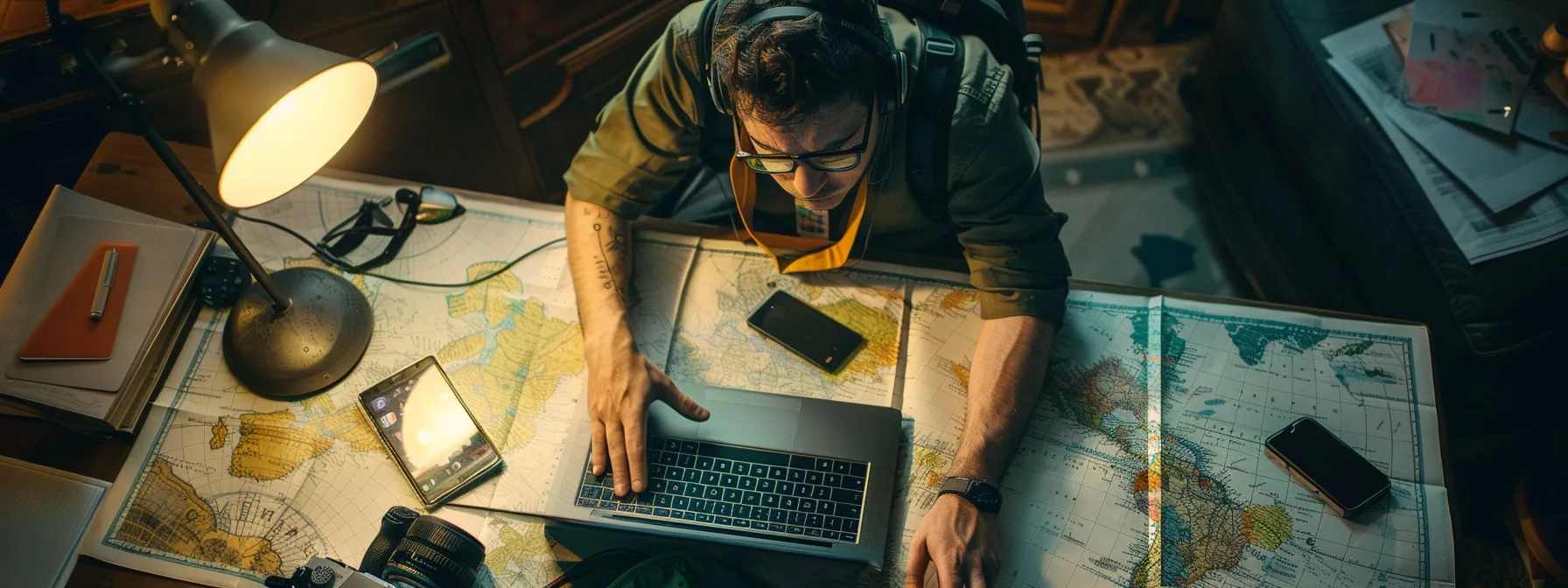
To thrive as a perpetual traveller, you need to master several essential aspects of long-term travel. This section will cover managing your finances while moving, staying connected with friends and family, and maintaining health and wellness abroad. You’ll also learn how to balance remote work with travel life, as well as ways to overcome the unique challenges of extended journeys.
Managing Finances While on the Move
Managing finances while on the move is vital for perpetual travellers, ensuring that you can sustain your journey without unnecessary stress. Begin by establishing a clear budget that outlines your expected expenses, including accommodation, food, transportation, and activities. Tools like budgeting apps can help track your spending in real-time, allowing you to make adjustments as needed and avoid overspending.
Consider utilizing local currencies and exchange options to minimize transaction fees when accessing your funds abroad. Use ATM machines affiliated with your bank, as they often provide better exchange rates compared to currency exchange booths. Additionally, having a travel-friendly bank card can help you efficiently manage your finances without carrying significant cash.
To optimize your financial resources, explore opportunities for earning while travelling, such as remote work or freelance gigs. Websites that connect you with short-term job assignments can help you supplement your income as you explore different locations. By diversifying your income sources and keeping a close eye on your budget, you will find a comfortable equilibrium between travel and financial stability:
Staying Connected With Friends and Family
Staying connected with friends and family while you travel allows you to maintain vital support networks. Utilize various communication tools such as video calls, messaging apps, and social media to share your experiences in real time. These interactions not only keep your loved ones updated but also help you feel anchored, reducing any feelings of isolation that might come with your travels.
Scheduling regular catch-ups can enhance your sense of connection, even from afar. Setting aside time for a weekly family video chat or sending postcards from your destinations creates meaningful touchpoints. This effort helps your friends and family feel involved in your journey, allowing you to share your slow travel adventures and deepening those relationships despite the distance.
Additionally, consider involving your loved ones in your travel plans. Ask for their recommendations on places to visit or experiences to pursue as you explore new destinations. This collaborative approach fosters a sense of community and shared travel experiences, making your journeys more enriching and enjoyable. By staying connected, you are contributing to your emotional well-being while navigating the art of slow travel.
Maintaining Health and Wellness Abroad
Maintaining your health and wellness abroad requires a proactive approach as you navigate your slow travel journey. Prioritize physical activity by integrating exercise into your daily routine. Opt for walking or biking to explore your surroundings, as these activities not only keep you fit but also allow for a more immersive experience with the local culture.
Your mental well-being is equally important during your travels. Take time to engage in mindfulness practices such as meditation or journaling each day. Finding a quiet spot in a park or café allows you to reflect on your experiences, reducing stress and enhancing your overall travel enjoyment.
Lastly, make conscious choices about your diet while traveling. Eating locally sourced foods not only supports the community but also provides your body with the nutrients it needs. By exploring local markets and trying traditional cuisines, you can maintain a balanced diet and enjoy the culinary richness of the places you visit.
Balancing Remote Work and Travel Life
Balancing remote work with travel life requires careful planning and adaptability. You should establish a routine that allows you to fulfill your work obligations while enjoying your travel experiences. This might mean setting specific hours dedicated to work, ensuring you remain productive and can take advantage of local attractions or community events outside those hours.
Utilizing co-working spaces or quiet cafés with reliable Wi-Fi can significantly enhance your efficiency, enabling you to stay connected without sacrificing your exploration time. Many cities offer vibrant co-working environments that not only provide a conducive workspace but also facilitate networking with other professionals. By blending these work and leisure activities, you can create a balanced lifestyle that supports both your career and your passion for travel.
Moreover, being flexible in your schedules can help you navigate time zone differences and productivity peaks. Embrace the rhythm of your environment, adapting your work hours to align with local culture and community life. This adaptability not only enriches your travel experience but also fosters a sense of belonging, allowing you to immerse yourself fully in the unique aspects of each destination while maintaining your professional commitments.
Overcoming the Challenges of Long-Term Travel
Overcoming the challenges of long-term travel begins with proper planning and adaptability. Issues such as finding reliable internet access for remote work or managing your budget can arise. Researching your destinations ahead of time and establishing flexible schedules that accommodate work and leisure can greatly alleviate these stressors.
As you travel, maintaining a balanced routine is essential for both physical and mental well-being. You may face difficulties in adjusting to new time zones or staying connected with friends and family. Incorporating regular exercise and mindfulness practices, such as meditation, can help you stay grounded while enjoying your experiences. Consider setting specific times for work and ensuring you allocate time to explore your surroundings fully.
Lastly, maintaining your motivation can be a recurring challenge during prolonged journeys. You might experience periods of loneliness or fatigue, especially when you’re away from familiar environments. Building a local support network through community events or social media groups can foster connections and provide a sense of belonging. These relationships will not only enhance your travel experience but also bring new energy and inspiration to your adventures:
Conclusion
Mastering the art of slow travel is essential for creating meaningful experiences that enrich your journey and foster genuine connections with local cultures. By embracing a mindful approach, you can enhance your personal growth, promote sustainability, and build lasting relationships while traveling. Implementing flexible itineraries and prioritizing immersive experiences allows you to appreciate the depth of each destination and reduce your environmental impact. Ultimately, slow travel transforms your adventures from a checklist into a fulfilling exploration of the world around you.
